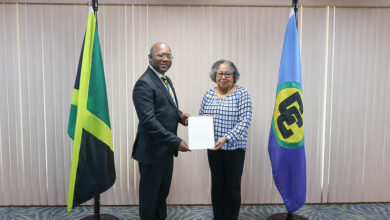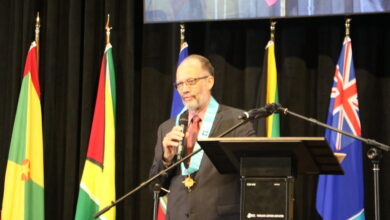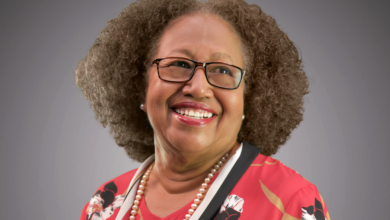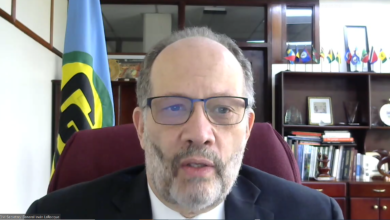Excellency, I wish to welcome you to the Headquarters of the Caribbean Community as you present your Letters of Credence as the first Plenipotentiary Representative of Sweden.
Your accreditation comes after years of building relations with members of the Community through the establishment of honorary consulates in each CARICOM Member State and the signing of Tax Information Exchange Agreements with eight of them. Also, Sweden is a member of the group of Nordic countries with which the Community has been engaging regularly in the margins of the annual United Nations General Assembly. I believe that under these circumstances, it is appropriate to say that your accreditation to the Community is very welcome.
Excellency, in your country’s letter of request for accreditation to the Community, Climate Change was identified as a shared area of importance. Sweden’s integral role in placing the environment on the global political agenda started with an initiative by your Government which culminated in the hosting of the first United Nations Conference on Human Environment in1972 in Stockholm. That landmark conference set in motion debates and discussions that resulted in the establishment of the United Nations Environment Programme, which in turn, in partnership with the World Meteorological Organization, established the Intergovernmental Panel on Climate Change (IPCC). The first assessment report of the IPCC served as the basis for negotiating the United Nations Framework Convention on Climate Change, the framework within which global climate change issues are negotiated.
The impact of climate change on our Community threatens our very existence given the reality of sea-level rise and the increased frequency and intensity of climatic events. The latest report of the Inter-governmental Panel on Climate Change (IPCC) indicates an increasing recognition of the risks to small islands and low-lying coastal developing states (SIDS) from climate-related processes originating well beyond their borders. The report also stresses that the ability of SIDS to undertake adaptation and mitigation programs, and their effectiveness, can be substantially strengthened through appropriate assistance from the international community.
It is my hope that at the upcoming Meeting of the Conference of the Parties later this year in Peru, all participating countries can come to an agreement on the reduction of greenhouse gas emissions that is acceptable to everyone and is favourable to SIDS.
Excellency, the effects of climate change are just one example of actions in the international arena which have their genesis outside our borders but expose the vulnerability of our small states, particularly to exogenous shocks. Of a similar nature is the global financial and economic crisis which continues to have a disproportionate impact on most of the economies of CARICOM Member States.
At this time when resources are needed most to assist us in alleviating the situation, we are faced with the policy of differentiation or graduation of middle income countries from access to concessionary financing. Based primarily, as that is, on the flawed assumption that GDP per capita is the primary measure of development, it fails to take into account other critical factors such as the lack of resilience to those shocks. The impact of such global phenomena on our small states is out of proportion to that of the more developed countries and impairs the capacity of small states to pursue their desired development path.
Yet another manifestation of how we are affected by activities which emanate from outside of our borders is the proliferation of small arms in our Member States. The illegal trade in arms along with the transnational trade in illegal drugs, has severely compromised the security of our citizens and threatens our economic and social development. CARICOM therefore played an active role in the negotiations for the UN Arms Trade Treaty (ATT), the first ever international treaty to attempt to regulate the trade of conventional weapons. We therefore applaud Sweden’s support for and signature of this Treaty and look forward to collaborating with you on its implementation.
Excellency, the fact that in 2012 Sweden contributed 0.99% of its gross national income or US $5.24 billion to Overseas Development Assistance (ODA) is evidence of its desire to assist those countries which are less fortunate. I trust that in identifying countries that will benefit from your development assistance, you will take into account the peculiar vulnerabilities of small developing states.
In that regard, within our Community there are areas in which a significant amount of work needs to be done to give those less privileged a chance at a better life and raise their standard of living. There are distinct possibilities for us to work together to improve, for example, the prospects of our youth, to re-skill the large cohort of unemployed and help build the human resource capital so necessary for our sustainable development.
Indeed, we would like Sweden to partner with us as the international community negotiates the Post 2015 Development Agenda to ensure that it emanates from an open, transparent and inclusive process and takes account of the interests of small developing states. That process must recognise the unique and particular vulnerabilities and challenges of SIDS as a priority and foster their resilience as a key objective towards their sustainable development.
Ambassador, the Community sees your accreditation as a welcome sign of establishing a closer relationship with CARICOM to enable us to work together for our Region’s development based on areas of mutual interest. Already Sweden has demonstrated that it is willing to be involved in areas that are close to the heart of the Caribbean with its decision to make a financial contribution to the monument to honour the victims of slavery and the transatlantic slave trade in the vicinity of the UN Headquarters.
I have no doubt that your wealth of experience as a representative of your country will be applied accordingly, as you carry out the duties which have been entrusted to you by your Government.
Excellency, I gladly accept your Letters of Credence and welcome you to the CARICOM family.
Thank you.





